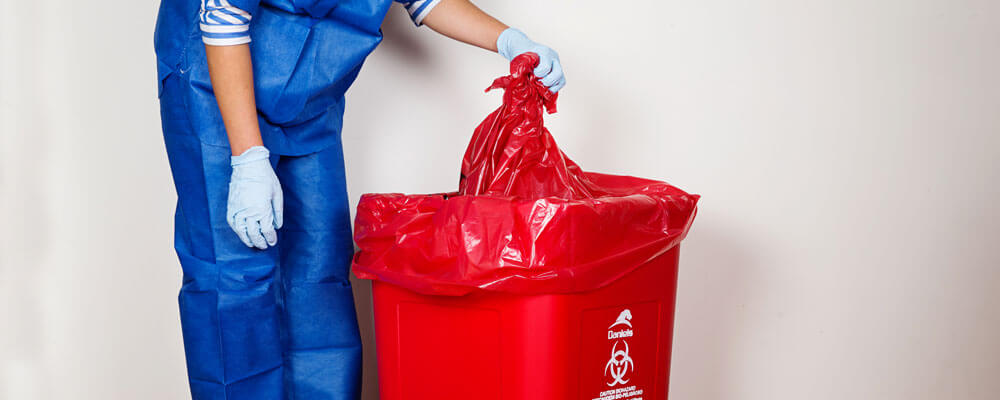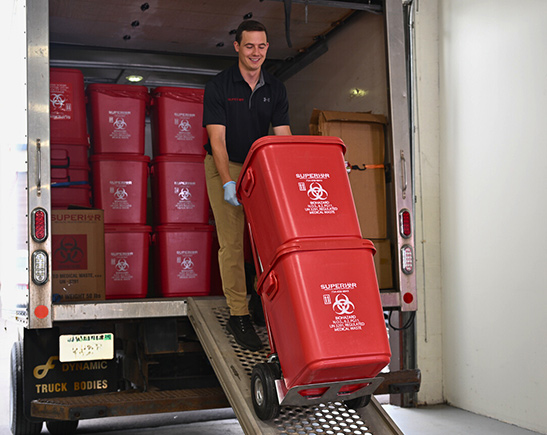Proactive Health Solutions: Selecting the very best Medical Waste Removal Near You
Proactive Health Solutions: Selecting the very best Medical Waste Removal Near You
Blog Article
Remain Ahead of Rules: Professional Guidance on Medical Garbage Disposal
In a world where the healthcare market is regularly developing, it is critical for clinical centers to stay in advance of regulations when it concerns the appropriate disposal of medical waste. With strict guidelines and frequent regulatory adjustments, it can be challenging to browse the complexities of this procedure. With expert guidance, facilities can make certain compliance and mitigate threats linked with improper waste disposal. From understanding the different categories of clinical waste to applying the appropriate collection and segregation techniques, this conversation will certainly provide useful understandings and actionable suggestions to aid centers remain ahead of laws in the ever-changing landscape of clinical waste disposal.
Recognizing Clinical Waste Categories
Recognizing clinical waste categories is vital for appropriate disposal and administration in healthcare centers. Clinical waste describes any kind of waste produced by health care tasks that may posture a danger to public wellness or the setting. It is vital to categorize clinical waste precisely to guarantee its secure handling, disposal, treatment, and transport.
There are numerous groups of clinical waste that health care facilities need to be familiar with. The most usual classifications include transmittable waste, pathological waste, sharps waste, pharmaceutical waste, and chemical waste. Each group has certain guidelines and laws for its correct administration and disposal.
Infectious waste consists of materials infected with blood or various other physical fluids, such as handwear covers, dress, and lab societies. Pathological waste refers to human cells, organs, or body components that call for unique handling and disposal. Sharps waste includes used needles, syringes, and other sharp objects that can trigger injury and transfer infections. Drug waste consists of expired, unused, or infected medicines that need mindful handling and disposal. Chemical waste includes solvents, disinfectants, and other chemical compounds made use of in healthcare centers.
Remaining Up-To-Date With Regulatory Modifications
Staying present with governing changes is essential for medical care centers to ensure compliance and proper administration of medical waste disposal. medical waste removal. With regulations continuously developing, it is vital for medical care centers to stay updated to prevent penalties, penalties, and potential injury to the atmosphere and public health
To remain in advance of regulative changes, health care centers ought to establish a system for tracking and monitoring updates. This can be done by subscribing to regulative newsletters, attending workshops and meetings, and actively taking part in sector associations. In addition, facilities ought to assign a team member or group in charge of staying educated and distributing info to pertinent stakeholders.
Normal communication with regulatory companies is also vital. Medical care centers must establish partnerships with local, state, and federal agencies to guarantee they know any modifications in regulations that may affect their waste monitoring techniques. This can be done via normal conferences, participation in public remark durations, and aggressive engagement with regulative companies.
Moreover, healthcare centers ought to think about partnering with waste monitoring firms that specialize in clinical waste disposal (medical waste disposal services with WasteX). These companies are usually skilled in the most current guidelines and can give guidance and assistance to make certain conformity
Executing Proper Collection and Segregation Approaches
To effectively manage medical waste disposal, health care centers should develop proper collection and segregation techniques in accordance with governing standards. Implementing these methods makes certain the risk-free handling and disposal of potentially hazardous products, safeguards the atmosphere, and decreases the threat of infections and injuries to medical care workers and the basic public.
Proper collection and segregation approaches involve the use of designated containers and classifying systems. Medical care facilities ought to provide clearly identified containers for various kinds of medical waste, such as sharps, transmittable waste, pharmaceutical waste, and non-hazardous waste. These containers should be color-coded and plainly marked to prevent confusion and advertise very easy recognition.
Furthermore, health care centers must train their team on the right procedures for accumulating and setting apart medical waste. This consists of informing them on the various sorts of waste, the suitable containers to make use of, and the value of adhering to guidelines and laws. Regular training sessions and refresher programs need to be performed to ensure that team participants stay current on ideal methods.
Furthermore, health care facilities need to develop a system for routine collection and disposal of clinical waste. This might entail partnering with licensed waste management companies that specialize in clinical waste disposal. These firms will make certain that the accumulated waste is transferred and thrown away in conformity with regulative requirements.
Selecting the Right Disposal Methods

Incineration article is one of the most common and effective methods for throwing away particular kinds of medical waste, such as pathological waste and sharps. It involves the regulated combustion of waste at high temperatures, reducing it to ash. Incineration can release damaging contaminants right into the air and contribute to air contamination.

Chemical therapy involves the usage of chemicals to counteract the waste and disinfect. Microwave therapy uses microwave energy to warmth and sanitize the waste.
Making Certain Conformity Via Paperwork and Training
After carefully considering the suitable disposal techniques for clinical waste, healthcare centers should make certain compliance with guidelines and minimize ecological influence by applying effective paperwork and training procedures. This action is critical in preserving a sustainable and secure setting for both healthcare workers and the general public.

Training is equally important in guaranteeing conformity with policies. Healthcare employees who take care of clinical waste must receive suitable training on waste partition, managing, and disposal procedures. This training must cover topics such as the proper usage of personal protective equipment, recognition of various types of waste, and the proper disposal approaches for each and every waste category. By giving extensive training, health care centers can empower their team to make informed choices and lessen the danger of incorrect garbage disposal.
Verdict
Finally, staying ahead of regulations in medical waste disposal is essential for healthcare centers. medical waste removal near me. Comprehending the different groups of clinical waste, remaining updated with regulative visit this page adjustments, carrying out appropriate collection and partition techniques, picking the proper disposal approaches, and making sure conformity via paperwork and training are all necessary steps. By complying with these standards, healthcare organizations can properly take care of and get rid of of medical waste in a liable and risk-free fashion
From understanding the various categories of medical waste to applying the best collection and segregation approaches, this discussion will certainly supply valuable insights and workable suggestions to help centers stay in advance of regulations in the ever-changing landscape of medical waste disposal. - medical waste disposal services with WasteX
The most common classifications include contagious waste, pathological waste, sharps waste, pharmaceutical waste, and chemical waste. Health care centers should offer clearly identified containers for different kinds of clinical waste, such as sharps, infectious waste, pharmaceutical waste, and non-hazardous waste. Medical care centers should establish a thorough system to videotape and track all elements of medical waste disposal, consisting of types of waste created, amounts, and disposal approaches made use of. Healthcare employees that handle medical waste needs to receive ideal training on waste segregation, handling, and disposal procedures.
Report this page